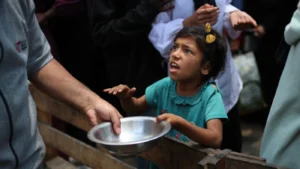Ten things the UK could do if it truly cared about Palestinians

A Palestinian girl holds an empty pan at a hot meal distribution point in Nuseirat, Gaza, on 4 June 2025
Alexandra Hall Hall writes in Middle East Eye on 5 July 2025:
Supporters of Israel frequently decry the alleged double standards applied to it, noting that Israel has been the subject of far more critical UN resolutions than any other nation. They argue that it suffers disproportionate international opprobrium for its treatment of Palestinians, particularly since it launched its devastating assault on Gaza following the brutal attacks by Hamas on 7 October 2023.
Advocates for Israel ask why there is not the same level of public attention and outrage about other ongoing wars and humanitarian crises, such as in Sudan or Myanmar.
**** ****
I would argue that whatever the historical twists and turns of the Israeli-Palestinian conflict, the boot is firmly on the other foot when it comes to double standards today. Israel is no longer a weak, fragile state struggling to survive but overwhelmingly the most dominant and militarily capable power in the region. It is no longer Israelis who are at risk of being driven “into the sea” but Palestinians. It is no longer Israelis who are at risk of suffering a second genocide, but Israelis who are now committing actions tantamount to a genocide of their own.
Israel was entirely justified in taking action after the truly atrocious events of 7 October to try to prevent another such attack and secure the release of the Israeli captives taken by Hamas. I make no argument in support of Hamas, which triggered the latest round of fighting, is prolonging the crisis by refusing to release the captives and has itself weaponised humanitarian aid. It is a terrorist group to be shunned entirely.
But Israel’s response in Gaza has now gone way beyond what might be deemed legitimate or proportionate. It has involved numerous violations of international humanitarian law – such as firing on civilians, medical teams and journalists – and does not appear to be part of any plausible end strategy to ensure longer-term peace and security in the region.
